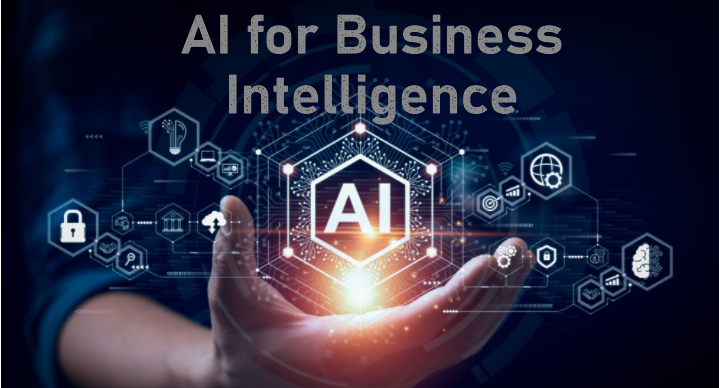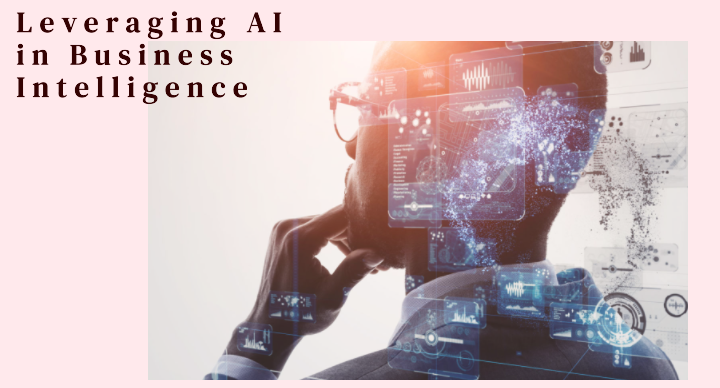
Harnessing AI for Business Intelligence
In the relentless speed of today's digital sphere, a towering challenge faces businesses — how to capture and convert this data tsunami into a competitive edge. Artificial Intelligence (AI), fortunately, steps in as a transformative force, revolutionizing the Business Intelligence (BI) field. Integrating AI technologies seamlessly into BI tools allows organizations to tap into unexplored potential and herald a novel era of data analysis.
Unleashing Untapped Potential: AI Meets BI
Previously, businesses anchored their critical decisions on historical data. AI, however, now propels BI to unprecedented heights, acting as a catalyst. AI augments human intelligence with machine learning algorithms and predictive analytics, arming organizations with unparalleled insights. Consequently, they can anticipate market trends confidently and base decisions on data, not just hunches.
AI-BI Integration: Benefits and Hurdles
Integrating AI into BI brings far-reaching benefits. Primarily, it enables businesses to process enormous volumes of data in real-time, providing nearly instantaneous access to crucial information. Using AI algorithms, organizations can mine mountains of data to unearth patterns, correlations, and anomalies that would otherwise stay concealed. This ability lets businesses detect emerging opportunities and efficiently mitigate potential risks.
Secondly, BI tools powered by AI allow users to ask complex questions and receive precise, actionable insights. Natural Language Processing (NLP) capabilities let users converse with data directly, democratizing data analysis across the organization. This democratization cultivates a data-driven culture, making insights accessible to individuals, no matter their technical proficiency.
One of the most thrilling features of AI-enabled BI is its predictive capability. Organizations can employ advanced machine learning algorithms to transcend historical analysis and peek into the future. AI models uncover hidden patterns, extrapolate trends, and forecast potential outcomes, equipping businesses to make proactive decisions rather than simply reacting to past events. This predictive power offers a substantial competitive edge, enabling businesses to stay ahead of the curve and strategize with assurance.
However, integrating AI into BI also presents hurdles. A significant obstacle is ensuring data accuracy and quality. AI algorithms depend on high-quality, reliable data to produce precise insights. Bad data in, but data out. Therefore, organizations must give priority to data governance, invest in robust data infrastructure, and apply stringent data validation processes to preserve the integrity of their analyses.
Privacy and Ethics in AI-Powered BI
Another challenge concerns the ethical and privacy considerations tied to AI-powered BI. As organizations collect and analyze vast amounts of customer data, they must strike a balance between gleaning insights and respecting privacy. Transparency, data anonymization, and regulatory compliance should be central to any AI-driven BI initiative.
Despite these challenges, it's essential for organizations seeking a competitive edge to embrace the fusion of AI and BI. By harnessing AI's analytical power, businesses can discover hidden opportunities, spur innovation, and offer superior customer experiences. Crafting a comprehensive AI strategy, cultivating a data-driven culture, and developing the talent required to manage these transformative technologies are crucial success components.

AI-BI Transformation Across Sectors
Moreover, AI-powered BI can transform various sectors. In healthcare, AI algorithms can analyze patient data, medical records, and research findings to assist in diagnoses, predict outcomes, and suggest personalized treatment plans. In finance, AI-driven BI can detect fraudulent activities, optimize investment strategies, and provide real-time risk analysis.
Manufacturing companies can use AI to optimize production processes, predict equipment failures, and enhance supply chain management. The opportunities are limitless.
Additionally, AI in BI can create new revenue streams. Organizations can create AI-powered BI tools as products or services, offering them to other businesses needing advanced data analysis capabilities. This is further to the current BI intelligence tools whereby offering power bi courses to those who need training in BI are already capitalizing on the increased demand for BI. This opens a new market and revenue potential, broadening the reach and impact of AI in the business world.
As they delve deeper into the integration of AI and BI, organizations need a holistic approach to unlock the full potential of these transformative technologies. This begins with crafting a comprehensive AI strategy aligned with the organization's goals and objectives. The strategy should define the specific AI use cases in BI, the required data sources and infrastructure, and the necessary talent and skills to execute the strategy effectively.
Building a Data-Driven Culture for Success
Building a data-driven culture is equally crucial. This involves fostering a mindset that views data as a strategic asset, with decisions grounded in data-driven insights. Organizations need to invest in training programs that enhance data literacy across departments, empowering employees to use AI-powered BI tools and make informed decisions based on data analysis.
To fully leverage AI in BI, organizations should encourage collaboration among data scientists, business analysts, and domain experts. This multidisciplinary approach ensures that the insights AI algorithms generate are not only accurate but also contextualized and actionable. By blending technical expertise with domain knowledge, organizations can extract meaningful insights that drive business growth and innovation.
Worth noting is that AI in Business Intelligence is not a one-time implementation but an ongoing journey. The field of AI is constantly evolving, with new algorithms, techniques, and technologies emerging regularly. Organizations must keep up with these developments and continuously refine their AI strategies to stay competitive. This requires a commitment to research and development, collaboration with AI experts and industry leaders, and a willingness to adapt to the changing landscape.
Ensuring Ethical AI Practice in BI
Ethical considerations play a central role in AI-powered BI. As organizations use AI algorithms to analyze massive amounts of data, privacy, transparency, and accountability become essential. Organizations must ensure compliance with relevant data protection regulations, implement robust security measures to protect sensitive information, and establish clear ethical data usage guidelines.
Transparency in AI algorithms is vital to gain user trust and prevent bias or discriminatory outcomes. Organizations should strive to create explainable AI models that provide insight into decision-making processes. This transparency not only enhances trust but also enables users to identify potential biases and rectify them to ensure fairness and equity.
The integration of AI and BI also raises concerns about job displacement. While AI-powered BI can automate certain tasks, it also creates new roles and opportunities. Organizations should concentrate on reskilling and upskilling their workforce, enabling employees to transition into roles requiring higher-order skills such as data interpretation, strategy formulation, and decision-making. By investing in their employee's professional development, organizations can build a workforce well-equipped to effectively leverage AI in BI.
Conclusion: Embracing the AI-BI Fusion for Strategic Advantage
Integrating AI technologies into Business Intelligence tools heralds a new data analysis era. Organizations embracing this transformative power gain access to real-time, actionable insights that drive growth, innovation, and strategic decision-making. The fusion of AI and BI enables businesses to navigate the complex data landscape, uncover hidden opportunities, and outpace the competition.
Share this post
Leave a comment
All comments are moderated. Spammy and bot submitted comments are deleted. Please submit the comments that are helpful to others, and we'll approve your comments. A comment that includes outbound link will only be approved if the content is relevant to the topic, and has some value to our readers.

Comments (0)
No comment